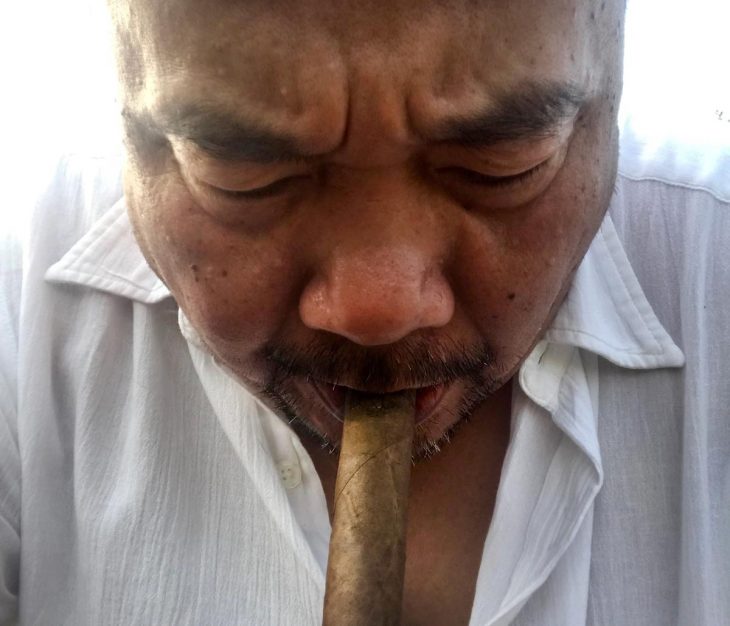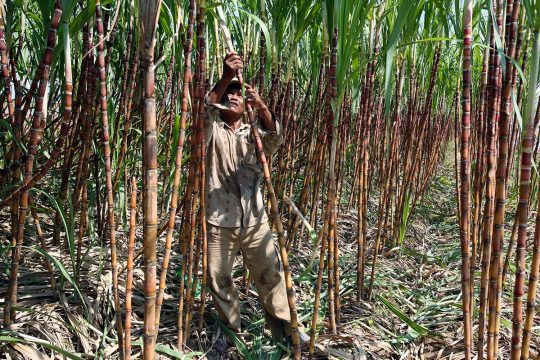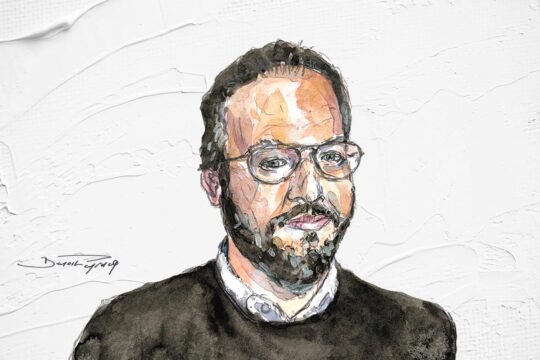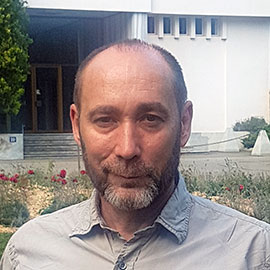JUSTICEINFO.NET IN-DEPTH INTERVIEWS
Rithy Panh
Cambodian film maker and survivor of Khmer Rouge crimes
After the conviction of the last two surviving Khmer Rouge leaders for genocide and crimes against humanity Rithy Panh, who survived four years of terror under Pol Pot, gives his reaction to this judgment and the justice rendered 40 years on. He describes an experience of genocide beyond bodies, inaccessible to a court, and his constant dialogue with the dead.
JUSTICEINFO.NET: How do you react to the verdict handed down in Phnom Penh on November 16, convicting Nuon Chea et Khieu Samphan for genocide ?
RITHY PANH: Headlines in the national and international press said it: for the first time the genocide has been recognized. Then there were a couple of lines about the genocide of Cham and Vietnamese people. Most people think this means there is a conviction for the whole genocide in Cambodia. The Chams see themselves as Cambodians and so do the Vietnamese in Cambodia. If we have a conviction for them, then Cambodians are also victims of genocide.
But for me there is something else missing, a definition of the crime. I no longer felt Cambodian at all under the Khmer Rouge. I was dispossessed of everything, my first name, my religious and cultural practice, my family -- everything was torn apart. I felt under attack in my identity, my dignity. I was on death row, and I was nothing. There is an attack on something that is deeper than the crime. In the first trial [against Duch, former director of the S-21 prison in Phnom Penh, sentenced in 2010], it was not defined either.
The decision is welcome, but the court cannot convict for everything involved. I have always supported this court. I think it's useful and something will always come out of it, even if I disagree with a lot of things. In my village, there are mass graves. I buried people myself in mass graves. There was not a single search. Not a single grave has been excavated, to my knowledge. There were no forensics. What interests me is not so much the Khmer Rouge security sites, it's what happened in the villages. Executing people in villages, not giving them medical care is a crime. I find it surprising that four or five villages have not been chosen for a study. It’s like a return to the Vietnamese show trials like in 1979 [In 1979, under Vietnamese occupation, a trial sentenced Pol Pot and his brother-in-law Ieng Sary in absentia for genocide; this trial is generally considered a show trial].
Are you comparing the two?
I think the 1979 trial did a lot. It was certainly too political, but lots of evidence has been gathered from it. The fact that Nuon Chea was not cited in the Duch trial makes me sick. Taking the S-21 case is to understand the Khmer Rouge doctrine. But the trial failed there. It should have gone further and brought in Nuon Chea.
Is it shocking to have separated the crime against the Chams and the Vietnamese, described as genocide, from that against the rest of the Khmer people, described as a crime against humanity?
What more did the Cham and Vietnamese suffer than all Cambodians?
What is shocking is that the majority of those who have been through this are Cambodians. So you have to explain this separation to me. In what way does the treatment of Chams and Vietnamese qualify more as genocide? Personally, I don't mind, but what more did they suffer than the Cambodian people as a whole?
So you think everyone was victim of the same crime?
Yes. We were forced to eat rats. Buddhists were told they should no longer pray. I remember my mother finding two or three sticks of incense. She lit them but then rushed to extinguish them because we hadn't smelled incense for months and it could be smelled from very far away.
So the Khmers were targeted as Buddhists and so should also have been recognized as victims of genocide?
They tried to wipe out our religion, our identity, our culture, our dignity. We were no longer part of the population.
That’s it. Did they attack my identity? Yes. I was no longer called Rithy Panh, I no longer had a name. They tried to wipe out our religion, our identity, our culture, our dignity. We were no longer part of the population.
So how do you assess this tribunal, after 12 years of its existence?
I am surprised how interested Cambodians are in it. I disagree with those who say they are not interested. Maybe I'm short-sighted, but I see them interested. Young Cambodians have more questions than those who experienced the genocide. When you create an App on Khmer Rouge history, there are 25,000 to 30,000 downloads. That's not bad! It's free, and it's the story of the Khmer Rouge for school students. A labour camp for the younger generation means absolutely nothing if you don’t provide an image. We bring the image and they understand better.
In this court at least, there are the civil parties, there are the accused with their lawyers, they argue. In my life in Cambodia, I've never seen anything like it.
Another thing I think is good is that we have never had a justice debate like this. Even in the Sihanouk era, we never had that. We have never believed in justice, even to this day. We've always had justice for the strongest. In this court at least, there are the civil parties, there are the accused with their lawyers, they argue. In my life in Cambodia, I've never seen anything like it.
So the court has served as an example, but it is also said that it has had no impact on the functioning of national justice...
Yes, but I think there will be an impact later, perhaps. We have to be patient. At least it existed. Young Cambodian historians are writing, whereas before there were none. History teaching has not progressed much, but we are taking more risks. For years, teaching Khmer Rouge history was viewed as propaganda. Now it is more balanced, more fair.
You have wanted to create links between Cambodians and Rwandans, and you have had contacts with survivors of the Shoah. Is there a common bond between survivors of genocide?
Yes. I recently lost Marceline Loridan [French filmmaker, Holocaust survivor, deceased in September 2018], with whom I had had private and constant exchanges. There was a lot of talk about who we are, the survivors. There are these dead people who are with us all the time.
Do you feel that you speak the same language?
In terms of suffering, trauma, loss of self, I do not see the difference between myself and Marceline Loridan.
Yes, we share the same pain in any case. That is why I do not understand the terms genocide or crimes against humanity. In terms of suffering, trauma, loss of self, loss of family, loss of others, I do not see the difference between myself and Marceline Loridan. She has a number tattooed on her arm and I have a foot injury, which is also a form of tattoo. We all have a mark. It looks like she's been in the same place as me, or me with her.
Is the paradox that each crime is specific but that the experience of those who suffer is common?
Yes, that's why I think it's important to understand what it means behind the words. Legally, I am not saying that Cambodians fall into the category of genocide, but if I am allowed to explain point by point, perhaps we will understand better. In terms of destroying what is most precious in us as human beings, and in terms of intent - emptying Phnom Penh of its inhabitants is not improvised, when they want to register us, they register us, when they want us to die, they let us die - the power of death grows very quickly. In my village in 1976, the men "in charge" did nothing, but the process was thus accelerated so that there was large-scale elimination. That was clear in the case of the Jews because they were brought from everywhere and killed because they were Jews and because people built death factories. But when you see how people were killed in the swamps, it was as fast as in the gas chambers.
The definition of genocide is based on intent to destroy, so is it this intent that you felt?
Yes. We were the "new people". We were immediately given a name, classified in categories and given less rations than the "ancient people" of the land. We were not seen as part of it. The “ancient” people did not die from the intent to purify but from internal political struggles.
You are a filmmaker, what is the strength of the cinematographic art to evoke this?
I work on gestures, on bodies, on words, on how extreme violence affects the bodies of victims as well as the bodies of perpetrators.
I work on extreme violence. I work on gestures, on bodies, on words, on how extreme violence affects the bodies of victims as well as the bodies of perpetrators. There is a language at S-21 that is very important to show how people are dehumanized. If you work on the face, you see the face, you look into the eyes. Look at how Duch, for example, avoids eye contact. When I ask him why, and he looks at me, it's a different face. Sometimes physical presence can be translated. Cinema remains subjective, but sometimes it succeeds in this.
Your search is endless. You seem to be constantly renewing means and tools to find an impossible truth about extreme violence.
Yes, but is it me or is the world repeating itself? When you see the rhetoric of Orban or Salvini or Duterte or Bolsonaro or Trump, I have the impression that this way of speaking has returned. It scares the hell out of me.
This extreme violence is in us, we suffered it. With Marceline, we said to ourselves that we had already died once, but we keep this death in us. You know, when a baby is born, it sometimes has traces on the body, bruises, sometimes matching exactly the bullets received by a distant or close relative during war. It is said that he is reborn with the marks of the bullets he received. One of my cousins died and when his sister had a child, it had the exact mark of the bullets he had received. Do we pass trauma on to the child? Or is the person reborn?
This is the theme of your new work on trauma transmission, which recently took you to Japan, to the site of the nuclear bomb. What were you looking for?
I have the impression that this violence is such that it even changes us physically, changes our molecules.
I'm trying to see how this extreme violence is transmitted. Once the generation that suffered it directly disappears, is it over or is it passed on? I ask myself this question because I have the impression that this violence is such that it even changes us physically, changes our molecules. I don't understand, for example, why it doesn't disappear in my country, why it's not mitigated. The older you get, the more acutely you feel this. I have the impression that it is transmitted and I don't really like that idea. I see it and I try to find a way to talk about it, so that others can defend themselves, so to speak, so their immune systems can step up. I have the impression that by talking, by showing, things come out. Can we avoid transmitting it, I don't know, but I hope we can mitigate it.
Extreme violence means going beyond physical violence. The court did not address this at all. I remember that Vann Nath [Cambodian painter, S-21 survivor, died in 2011] was very hurt by the court. He said they only asked me how I was beaten, how I was tortured, but they not how I feel spiritually. Morally, spiritually, I am not asked any questions. He told me that he had chosen not to be a civil party to testify in another way, and that he had not been allowed to do this. He said they asked me all the time how many spoons of soup did you get, how did you shit in your cell, how many times did they torture you with electric shocks. It's important, but there's also what we felt afterwards. Beyond the physical.
And yet you come back to the body, your new work speaks of the impact on the body…
Yes, a physical impact on another scale, of a molecular nature. I have the impression of circular communication, from the body to beyond the body, with a return to body, to molecules. Apparently, this transmits, but I need the scientists to help me.
When you film, do you feel you are doing something for justice or for remembrance, or neither one?
I often forget all that. Justice, no, never, I'm not looking for that. It becomes a work of memory, but I don't realize that while I'm filming. I am interested first in what is contained in thoughts, gestures, words. My images are made of that, composed of gestures, words and silences. Afterwards, if it becomes a work of remembrance, so much the better, but that is not why I film or think.
Don't you realize that the work you have created is also a work of remembrance?
We hope to be appeased, but the appeasement of the soul is not automatic, otherwise I would not scream so much at night. Perhaps it is the defence of the soul or of the body?
After the event yes, I am aware of it. I am lucky that I don’t have to do anything else, perhaps also because I am a survivor. And so we come back to where we started, that the dead remain with me and I talk to them. I have a constant dialogue with them. I still scream at night. Forty years later, I scream, I see things. I am asked do you feel appeased? No, that’s not how it works. We hope to be appeased, but the appeasement of the soul is not automatic, otherwise I would not scream so much at night. Perhaps it is the defence of the soul or of the body? The story comes back to you, you scream, you wake up and you almost don't remember it. It's a call, something inside me. We can pretend not to hear, but I don't have the spirit to do that, or the cynicism to turn a deaf ear.
I have been more in dialogue with the dead than in the work of remembrance. But the dead can be considered as memory.
You have worked several times with foreign directors wanting to make films inspired by what happened in Cambodia under the Khmer Rouge. Hollywood dealing with subjects like genocide, doesn't that raise some concerns for you?
I don't really like Roland Joffé's film ["La déchirure", released in 1984], but it was he who made the Cambodian "genocide" known to the whole world. Before, people didn't know who the Khmer Rouge were. All at once there were millions of spectators. Angelina Jolie [director of "First they killed my father", co-produced by Rithy Panh] caused millions of people to watch. If she films in Khmer, it's good for me, it's the Cambodian language.
The film "Blood Diamonds" made Sierra Leone known like no other film, but many Sierra Leoneans hate the image the film reduces them to...
The beauty of fiction is that it reaches a wider audience. How many schoolchildren have seen Spielberg's "Schindler’s List" and how many have seen Lanzmann's "Shoah"?
Yes, there is a risk of that. The beauty of fiction is that it reaches a wider audience. How many schoolchildren have seen Spielberg's "Schindler’s List" and how many have seen Lanzmann's "Shoah"? And is it the same viewer who, twenty years later, will watch Lanzmann's film? Maybe it's easier for Spielberg or Jolie to make a film like that than it is for me or Lanzmann. I think they have a role, that they do a good job. I don't like Spielberg's film, but it did play a part. "The Deer Hunter" is a superb film, even if they all scream in Thai, not Vietnamese. The other day in Italy, a waitress told me that she had seen Angelina Jolie's film six or seven times. That’s amazing, isn't it? I've seen some people go with their families. At first, no Cambodians ever watched my films. There was not a single Cambodian in the cinemas. Today, young people are watching it.
Interviewed by Thierry Cruvellier, JusticeInfo.net.

RITHY PANH
Rithy Panh was 11 years old when the Khmer Rouge took power, in April 1975. He was sent to labor camps where he lost a large part of his family, including his parents. After the fall of the regime, he took refuge in France, in 1980, and studied cinema. He is today's most famous Cambodian film director. A major part of his work has been devoted to extreme violence and the crimes of the Khmer Rouge, including « S-21, the Khmer Rouge Killing Machine », « Duch, Master of the Forges of Hell » and « The Missing Picture ».







